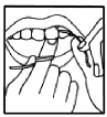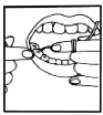Taking Care of Your Teeth and Mouth
No matter how old you are, you need to take care of your teeth and mouth. When your mouth is healthy, you can eat the foods you need for good nutrition. You will also feel better about smiling, talking, and laughing. Teeth are meant to last a lifetime. By taking good care of your teeth and gums, you can protect them for many years.
Tooth Decay
Teeth are covered in a hard, outer coating called enamel. Every day, a thin film of bacteria builds up on your teeth. Over time, the bacteria can cause holes in the enamel. These holes are called cavities. Brushing and flossing your teeth can protect you from decay, but once a cavity happens, a dentist has to fix it.
You can protect your teeth from decay by using fluoride toothpaste. If you have a lot of tooth decay, your dentist or dental hygienist may give you a fluoride treatment during an office visit. Or, the dentist may tell you to use a fluoride gel or mouth rinse at home.
Gum Diseases
Gum disease begins when plaque builds up along and under the gum line. This plaque causes infections that hurt the gum and bone that hold teeth in place. Sometimes gum disease makes your gums tender and more likely to bleed. This problem, called gingivitis, can often be fixed by daily brushing and flossing.
Other gum diseases need to be treated by a dentist. If not treated, these infections can ruin the bones, gums, and other tissues that support your teeth. Over time, your teeth may have to be removed.
To prevent gum disease:
- Brush your teeth twice a day with fluoride toothpaste.
- Floss once a day.
- Visit your dentist regularly for a checkup and cleaning.
- Eat a well-balanced diet.
- Quit smoking. Smoking increases your risk for gum disease.
Cleaning Your Teeth and Gums
There is a right way to brush and floss your teeth. Every day:
- Gently brush your teeth on all sides with a soft-bristle brush and fluoride toothpaste.
- Use small circular motions and short back-and-forth strokes.
- Take the time to brush carefully and gently along the gum line.
- Lightly brush your tongue to help keep your mouth clean.
| How to Floss | |

| 
| 
|
Hold floss as shown. | Use floss between upper teeth. | Use floss between lower teeth. |
You also need to clean around your teeth with dental floss every day. Careful flossing will take off plaque and leftover food that a toothbrush can’t reach. Be sure to rinse after you floss.
See your dentist if brushing or flossing causes your gums to bleed or hurts your mouth. If you have trouble flossing, a floss holder may help. Ask your dentist to show you the right way to floss.
People with arthritis or other conditions that limit hand motion may find it hard to hold a toothbrush. Some helpful ideas are:
- Slide a bicycle grip or foam tube over the handle of the toothbrush.
- Buy a toothbrush with a larger handle.
- Attach the toothbrush handle to your hand with a wide elastic band.
Dentures
Sometimes, dentures (false teeth) are needed to replace badly damaged teeth. Dentures may feel strange at first. In the beginning, your dentist may want to see you often to make sure the dentures fit. Over time, your mouth will change and your dentures may need to be adjusted or replaced. Be sure to let your dentist handle these adjustments.
When you are learning to eat with dentures, it may be easier if you:
- Start with soft, non-sticky food.
- Cut your food into small pieces.
- Chew slowly using both sides of your mouth.
Be careful when wearing dentures because they may make it harder for you to feel hot foods and liquids. Also, you may not notice things like bones in your mouth.
Keep your dentures clean and free from food that can cause stains, bad breath, or swollen gums. Brush them every day with a denture care product. Take your dentures out of your mouth at night and put them in water or a denture cleansing liquid. Partial dentures are used to fill in one or more missing teeth. Take care of them in the same way as dentures.
Dry Mouth
Dry mouth happens when you don’t have enough saliva, or spit, to keep your mouth wet. That can make it hard to eat, swallow, taste, and even speak. Dry mouth can cause tooth decay and other infections of the mouth.
Many common medicines can cause dry mouth. Try sipping water or sugarless drinks. Stay away from drinks with caffeine. Don’t smoke and avoid alcohol. Some people are helped by sucking sugarless hard candy or chewing sugarless gum. Talk to your dentist or doctor for other ideas on how to cope with dry mouth.
Oral Cancer
Oral cancer most often happens in people over age 40. Treatment works best before the disease spreads. Pain is not usually an early symptom of the disease. A dental check-up is a good time for your dentist to look for signs of oral cancer. Even if you have lost all your natural teeth, you should still see your dentist for regular oral cancer exams.
You can lower your risk of getting oral cancer in a few ways:
- Do not use tobacco products – cigarettes, chewing tobacco, snuff, pipes, or cigars.
- If you drink alcohol, do so only in moderation.
- Use lip balm with sunscreen.
Finding Low Cost Dental Care
The following resources may be helpful in finding low cost dental care:
For More Information
American Dental Association
211 East Chicago Avenue
Chicago, IL 60611
800-621-8099 (toll-free)
www.ada.org
National Institute of Dental and Craniofacial Research
National Oral Health Information Clearinghouse
1 NOHIC Way
Bethesda, MD 20892-3500
301-496-4261
www.nidcr.nih.gov
For more information about health and aging, contact:
National Institute on Aging Information Center
P.O. Box 8057
Gaithersburg, MD 20898-8057
800-222-2225 (toll-free)
800-222-4225 (TTY/toll-free)
www.nia.nih.gov
To order publications (in English or Spanish) or sign up for regular email alerts, visit www.nia.nih.gov/HealthInformation.
Visit NIHSeniorHealth.gov (www.nihseniorhealth.gov), a senior-friendly website from the National Institute on Aging and the National Library of Medicine. This website has health information for older adults. There are also special features that make it simple to use. For example, you can click on a button to have the text read out loud or to make the type larger.
National Institute on Aging
U. S. Department of Health and Human Services
National Institutes of Health
January 2007
